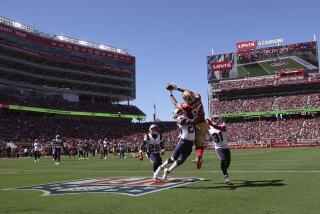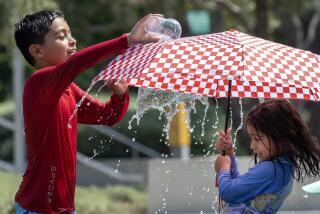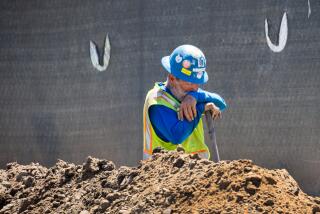Hot, but Not Bothered : With the Proper Precautions, You Can Exercise Safely in High Temperatures
- Share via
Summer has arrived early this year, forcing athletes to start thinking now about ways to beat the heat while exercising outdoors.
It’s not just a matter of keeping your cool. Fitness experts warn that discomfort can turn to danger if the proper precautions are not taken.
To avoid becoming overheated, they recommend drinking liquids before, during and after exercise, wearing a ventilated cap, and avoiding workout clothing that doesn’t breathe. Above all, they caution, exercisers should stop at the first sign of heat exhaustion--excessive sweating, fatigue, dizziness, nausea, impaired vision, or cold and clammy skin.
Dan Bright of Orange Coast College in Costa Mesa, who trains male and female athletes for track and field events, says the outdoor athlete should know the symptoms of heat exhaustion, heat stroke and dehydration when exercising in elevated temperatures.
“You’re obviously going to take more fluids,” he advises.
Heat exhaustion is a condition that could lead to a potentially fatal heat stroke. Signs include excessive sweating and fatigue. Heat stroke occurs when the body’s cooling system shuts down because of an elevated temperature. Symptoms are excessive fatigue, dizziness, nausea, disorientation, high blood pressure, vision obscured by bright light, and convulsions. The victim’s skin becomes hot, red and dry, Bright said.
“Heat stroke is a medical emergency,” Bright warns. “You actually stop sweating, and you’re very hot and dry.” Even the athlete trained for competition can be caught off-guard by heat stress, Bright says. But coaches and trainers are alert to the symptoms of heat stress.
At a recent track meet in Rancho Santiago, Bright said, the afternoon temperature had soared, and the Saddleback Valley College woman who won the 5-kilometer race collapsed at the finish line. Fortunately, she suffered only minor heat exhaustion.
“With the marathons and the longer races, we get concerned,” Bright said.
“When you’re dealing with heat and high humidity, it sucks the moisture out of you,” says Chip Marchbank, athletic trainer and director of the Rehabilitation Fitness Center at Golden West College. During inactive periods, Marchbank points out, 65% of heat is radiated from the body, 20% is secreted through sweat, 13% evaporates through the lungs, and 2% is eliminated through excretion. When exercising in heat, though, 99% of the body’s heat leaves the body through sweat, making hydration essential.
This summer may prove to be a very humid one, Marchbank says, because the heavy rainfall created a great deal of lush plant growth, which often creates humid conditions in hot weather.
Even beach volleyball players, who often have ocean breezes to cool them, have to consider the weather.
Dave West of Seal Beach, an avid beach volleyball player, says that when it gets really hot, the players hose down the courts to save the soles of their feet from the hot sand. “And we drink more water,” West said.


